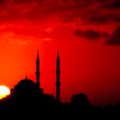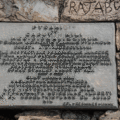The Forty Days (and 80 Years) of Musa Dagh

The Forty Days of Musa Dagh
by Franz Werfel
translated by Geoffrey Dunlop
revised by James Reidel
Softcover, $22.95
David R. Godine, 2012
Born in Prague in 1890, Franz Werfel lived a peripatetic life as a writer and traveler. He was employed as a teacher in Leipzig and then a soldier in what is now western Ukraine before moving to Vienna in 1915 to work for the imperial propaganda bureau. The position accelerated his literary career, and it was there that Werfel met future wife, Alma Mahler, in 1915. The two were married in 1929 and spent part of the following year travelling through the middle east.
In the course of their travels through Syria, Lebanon, and Turkey, Werfel began to interview Armenians who had just returned to Turkey after twenty years of mandated resettlement orders — and attempted genocide. In talking to these refugees, he learned of a Turkish Armenian community who had resisted the resettlement during the summer of 1915. Seven villages together moved their households onto the neighboring slope of Musa Dagh (“Moses Mountain”), which backed onto the Mediterranean Sea. The Armenian villagers valiantly defended the encampment against imperial forces for more than seven weeks, until they were evacuated to Egypt by a passing French warship.
Werfel’s fictionalized account of these events was published as The Forty Days of Musa Dagh in 1933 to widespread critical acclaim. It was among the first books of its time to articulate the biomedical ideology that lay behind systematic genocide, sparking obvious controversy within the contemporary German and Turkish governments alike. It was a watershed work of literature, and foreshadowed the horrific final solution of Nazi Germany.
Under pressure from the Turkish government, and with obvious self-interest, the German government banned Werfel’s novel a year after its publication, to the author’s dismay. The book, however, found a wide readership and high praise in the United States that same year. Then, in the summer of 1938, the Werfels themselves were forced by the Third Reich to flee Vienna for Vichy-occupied France, from which they eventually, and cinematically, escaped with the help of an American rescue committee. Franz Werfel spent the last five years of his life in the German-language expatriate community of Los Angeles, where he wrote, among others, a fictionalized account of the patron saint of Lourdes, The Song of Bernadette, which was a bestseller as well as an Oscar-winning film, and the play Jacobowsky and the Colonel, which was adapted as Me and the Colonel ten years later, starring Danny Kaye. However, although Louis B. Mayer of MGM bought the film rights to The Forty Days of Musa Dagh, and even cast a young Clark Gable in the lead, the Turkish government successfully suppressed its production. A major film adaptation of the novel has yet to appear.
The Forty Days of Musa Dagh is the most political and humanitarian of Werfel’s commercially successful works, a psychological drama of Old Testament proportions. Geoffrey Dunlop’s rendition, fully restored by James Reidel, meets the scope of the novel on its own terms, capturing Werfel’s imagery and rhetorical language. Musa Dagh is separated into five books ordered chronologically, each with a Biblical epigraph. The prose sweeps along lyrically, as if recounting a romantic epic, but its compressed language belies the epic scope.
Set between March and September of 1915, the novel begins with the arrival of Gabriel Bagradian in his ancestral hamlet of Yoghonoluk, one of seven villages at the foot of Musa Dagh, to settle his late brother’s accounts. Bagradian has lived in Paris for more than twenty years, married a French woman, and has a teenage son who knows no home other than France. Thoroughly assimilated to Western European culture, Gabriel is yet loyal and dutiful enough to retain Ottoman citizenship and even to serve in the Ottoman army. Upon his return, Bagradian feels self-conscious and uneasily aware of his cultural and philosophical distance from the village and from his own heritage:
He was a thinker, an abstract man, man as individual. What did the Turks matter, what the Armenians? He had thoughts of taking French citizenship. That, above all, would have made Juliette happy. But always, in the end, the same vague uneasiness had prevented it. He had volunteered for the war. Even if he did not live in his fatherland, he could not renounce it. It was his fathers’ land.
These fathers had suffered in it monstrously and still not given it up. Gabriel had never suffered. Massacre and torture he only knew through books and stories. It is not, he thought, a matter of indifference which country even an abstract man belongs to. So he remained an Ottoman subject.
He is decidedly more Franco-European than Ottoman, or Armenian, and his wife’s chatelaine mannerisms inspire jealousy and veneration in the villagers. Yet, over the course of the trip, Gabriel becomes enchanted by his grandfather’s former home, and his wife Juliette encourages him to relocate the family there for the summer.
The Bagradians’ rustic idyll is shattered by the arrival of three refugees: a charismatic young doctor, his pregnant wife, and his sister. They claim to have escaped from an Ottoman convoy, a forced march to the border and deportation without food. Those who cannot keep up are shot or left to die. “They had not fallen into the hands of an enemy who,” Werfel writes, “on reciprocal basis, had to respect international law. They had fallen into the hands of a far more terrible, unfettered enemy — their own country.” Bagradian attempts to secure aid and visas — as an Ottoman military veteran and as a resident of France — but his official efforts prove futile. The local emir, who had presided benevolently over the province since the time of Bagradian’s grandfather, is then forced into retirement by a regime-backed fundamentalist.
Reeling from this news, Bagradian canvasses the villages — how many people per household, how many livestock in the barns, how many guns hidden in houses. Inventory in hand, Bagradian gathers the elders together to announce his imminent move to the only naturally defensible, spring-fed fortress in the area: Musa Dagh. The majority of the villages elect to join him, and they move as much of their food, livestock, and ammunition up the mountain as they can, erecting plazas, a garrison and a meetinghouse, organizing communes around the principles of self-defense and survival. By the end of the siege, Bagradian has ceased to think of himself as a European temporarily held by war in his homeland:
An old saying of Bedros Altouni came back to him. To be an Armenian is an impossibility! Quite true! But Gabriel was finished with impossibilities. With indescribable certainty the one thing possible filled him. He had taken part in the destiny of his blood. He had led his native people in their struggle. But was not the new Gabriel more than blood? Was he not more than an Armenian? Before he had felt unjustly like an ‘abstract man’, ‘man as individual.’ He had had to pass through that holding pen of a community for this to become a reality.
The Bagradians’ alienation within the village is a shadowy parallel of the imperial xenophobia, and the process of acceptance he earns in the community serves as a counterpoint to genocide. In a particularly moving scene, the son Stephan is captured as he attempts to sneak through enemy lines and back to Musa Dagh. He is killed by the Ottoman forces, brutally, and in death reaches full identification with the suffering community:
Stephan had now become completely that Persian prince whom his mother had been so startled to perceive, the first time he had worn Armenian dress. Though Nunik had counted forty wounds, knife thrusts, bruises, contusions, all over the body, though his back was broken, and his throat gaped with a horrible slit in it — they had not touched his face. Stephan, behind closed lids, could still see the father for whom he longed, coming through the high doors of the station at Montreux. Not forty murderers had managed to efface his smile of delight that Papa should be lifting him in his arms again. He had died without being present at his own death. This bestial martyrdom had, by God’s grace, only assailed him as a far-off odor might. Now he seemed at perfect peace with himself, the dreamy prince.
The Forty Days of Musa Dagh grippingly evokes the horror of a community defending themselves against genocide by their own imperial government. Incorporating the conflict between Ottoman empire and French republic, between ancestral homeland and nation of choice, Werfel has created a nuanced protagonist whose identity mirrors the larger historical conflict. His richly detailed portrayal of village life masterfully evokes the constriction of Armenian-Ottoman citizens by the fascist imperial government at the start of the First World War. The Forty Days of Musa Dagh is timeless in its call of conscience in support of humanity.
About Jillian Saucier
Jillian C. Saucier is a writer and critic, and an MFA candidate at Boston University.




